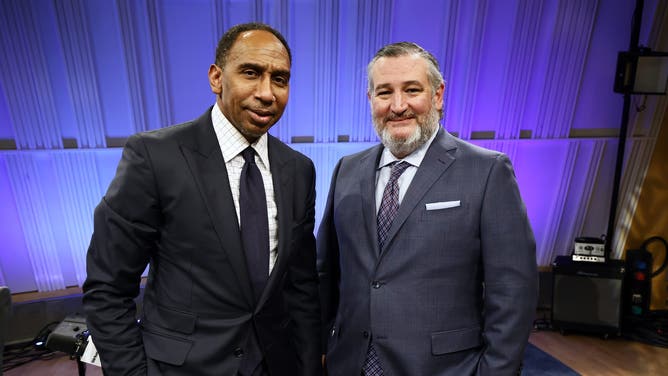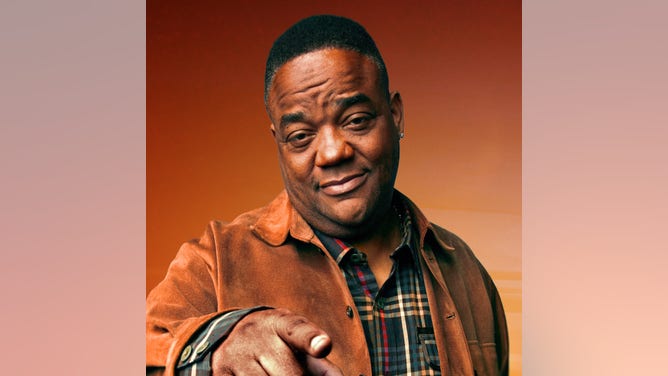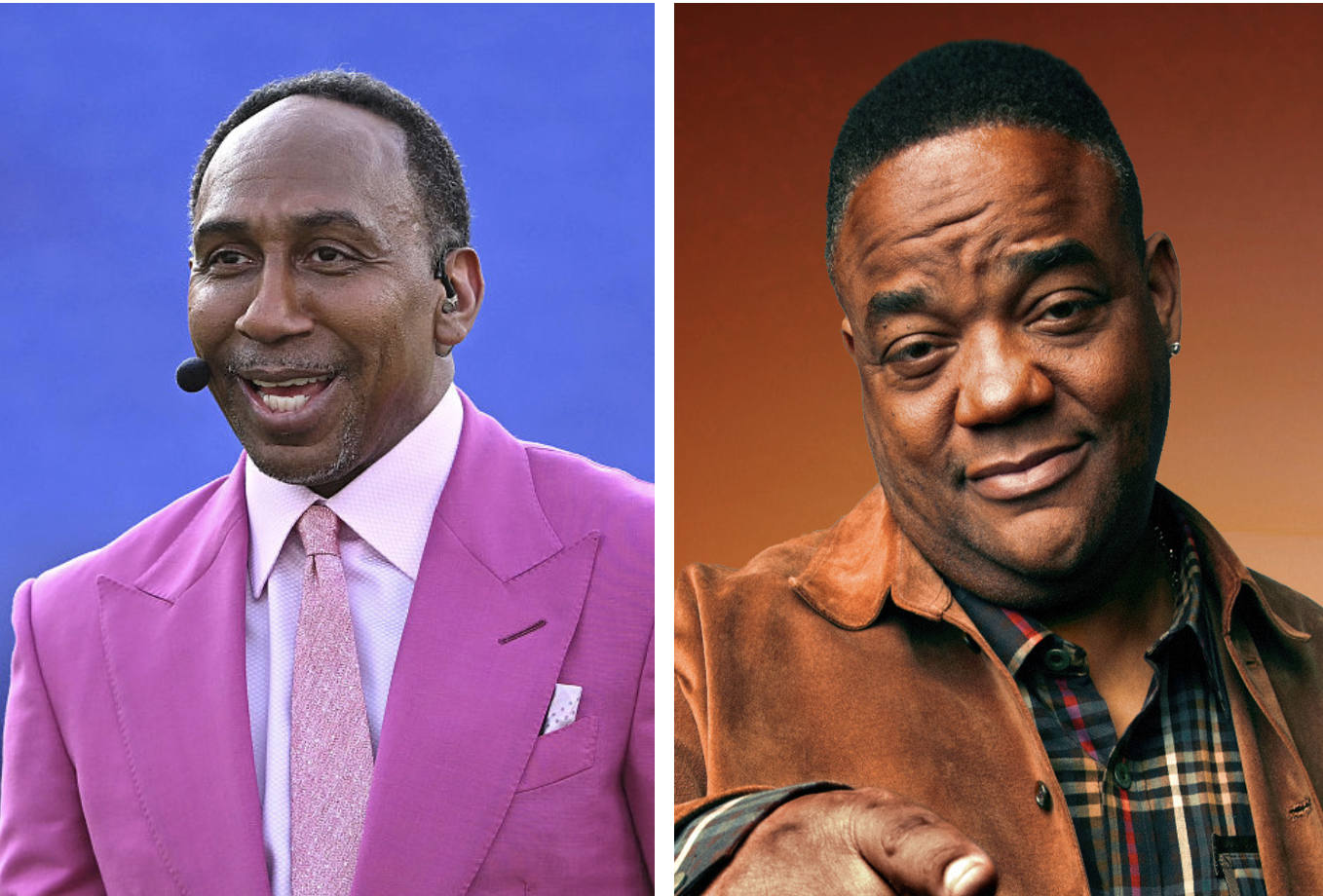Stephen A. Smith recorded an unplanned podcast late Friday evening, addressing Jason Whitlock, whom he called the “devil in the flesh.” Smith said that although he had promised never to mention Whitlock’s name again, he felt compelled to respond to comments Whitlock made about his father on Sage Steele’s podcast last week.
“Do a deep dive on Stephen A’s book and the way he went after his father in his book, as opposed to what he used to say about his father in interviews,” Whitlock said when Steele asked him about the inconsistencies he found in Smith’s 2023 memoir.
“You can go look up, in the late 1990s and early 2000s, what Stephen A said about his father — no criticism at all, mostly praise. Certainly no criticism,” Whitlock continued.
“And then he comes out with this book where he basically says he had an absentee father, that he can’t stand his father, and that it’s all about his mother. That’s trying to put Stephen A in the feminist lane, in the ‘support of the matriarchy’ lane … he had a completely different narrative about his dad than he does now.”
Appearing in a split screen with his business partner Kevin Frazier and nephew Josh, Smith insisted he “never spoke negatively” about his father because his “mother asked [him] not to.”
“My mother’s exact words to me were, ‘Do it when I’m dead and gone. Don’t do it when I’m alive and I have to live with the words that you have to say about your father,’” Smith said, quoting his late mother.
“What I did in speaking about my father was talk about what he did and the effect that it had on our family. I never said that I didn’t love him. I never said that I hated him. I never said any of those things. What I said was that I resented the impact that it had on our family and on my mother. But I never spoke about it because my mother always asked me to be quiet until she was dead and gone.”
In other words, Smith admitted that the version of his father’s story he tells now isn’t the one he told early in his career.
So why the emergency 45-minute rebuttal? Because, as OutKick has long noted, Smith reflexively launches into emotional, rambling monologues whenever he’s under attack. His first instinct is to overcompensate or deflect attention elsewhere.

WASHINGTON, DC – NOVEMBER 19: Host Stephen A. Smith in conversation with Senator Ted Cruz (R-TX) at a SiriusXM Town Hall event at SiriusXM Studio on November 19, 2025 in Washington, DC. (Photo by Paul Morigi/Getty Images for SiriusXM)
Last month, Smith faced backlash from what he called the “black community” after questioning whether Rep. Jasmine Crockett was more interested in viral media attention than in representing her constituents. While initially claiming he wouldn’t “back down,” we predicted he would quickly cave.
Since that prediction, Smith has:
– Apologized to Crockett, calling her a “sister.”
– Apologized to Kamala Harris and Michelle Obama for reasons unknown.
– Appeared on CNN with Laura Coates, challenging anyone who thinks he’s conservative to listen to his liberal views.
– Backtracked on his previous support for Trump deploying the National Guard.
– Challenged LeBron James to be more supportive of black journalists.
– Blamed Trump for the NBA gambling investigation, despite it predating Trump.
– Suggested the Miami Dolphins unfairly fired general manager Chris Grier because he’s black.
It’s reminiscent of last year, when Smith cited a poll during a Fox News appearance about black male support for Trump. After the usual outrage, he launched another week-long apology tour, praising Michelle Obama and accusing white people of racism.
When reached by OutKick earlier this month, Smith said he didn’t like, agree with, or respect my coverage. Unfortunately, he didn’t offer specifics. After he cooled down, I left an open invitation for him to address anything I had written about him in any media format he chose. We hope he eventually agrees to a discussion.
The core issue for Stephen A. Smith is that he’s trying to play too many roles at once, trying to satisfy too many different power players.
At ESPN, he must placate his Disney bosses, “the black community,” WME, and NBA athletes. Elsewhere, he needs to continue convincing his touring partners, Chris Cuomo and Bill O’Reilly, that he’s the anti-woke centrist between their political extremes.
On right-wing talk radio, Smith plays the disillusioned Democrat who’s coming around on Trump. On CNN, he fans the flames about the GOP’s supposed lack of respect for democracy.
All the while, he understands he cannot draw the ire of the Democratic leaders, in the event he launches a campaign in 2028.
Now, add the NFL to the list of groups he must appease.
The NFL is in the process of acquiring a 10% equity stake in ESPN. Smith is also now a contributor to Monday Night Football, which he touted as part of his new $100 million contract. He’s well aware of how much influence the leagues have over pregame programming. As the story goes, the NBA had previously blocked ESPN from allowing Smith to appear during the Finals.
Commissioner Roger Goodell, Cowboys owner Jerry Jones, and Patriots owner Robert Kraft are the three most powerful figures in the NFL. Smith has already cozied up to Jones, recently sitting with him in a suite during a Cowboys game. But his recent comments likely didn’t sit well with Kraft or Goodell.
Last week, Smith hosted First Take from Bethune–Cookman, a private HBCU, alongside Ryan Clark and Cam Newton. Playing to the crowd, he called white Patriots quarterback Drake Maye a “liar” for claiming he didn’t know Newton was on First Take.
“[Drake Maye] is a liar… First Take is the number one morning show… don’t tell me you’re an athlete and you don’t know that. Don’t tell me you’re an athlete and you don’t know that Cam Newton is on this show. You lying,” Smith said.
The outburst was popular on set but not elsewhere. Even media watchdogs criticized him for belittling the 23-year-old quarterback simply for not watching his show. “Self-manufactured Drake Maye feud shows the biggest flaw of First Take,” Awful Announcing wrote.
Barstool founder Dave Portnoy demanded an apology: “You call the MVP of the league a liar? Well, you owe us. Me, Drake Maye, the Krafts, all Patriots fans, an apology.”
And that’s where Jason Whitlock comes in.

There’s one tried-and-true way to get back into the good graces of the sports media establishment. And that’s to shift the negative attention back toward Whitlock, Clay Travis, or me.
Take the former, bitter sportswriter who now pens a weekly Substack column to convince the cool kids he’s on the right side of the culture war. His most-read story is a factually challenged hit piece about me. His fifth most-read is another hit piece, one about Jason Whitlock.
It’s not hard to see why. Mina Kimes and Jemele Hill loved the stories and shared them with the audiences the author wants to impress.
Likewise, Smith successfully deflected the attention away from his juvenile remarks about Maye by inserting Whitlock into the discussion. The same blogs criticizing Smith early last week now credit him for “destroy[ing]” Whitlock by calling him fat and a “walrus.”
Just like that, Smith is the good guy again. Whitlock is the boogeyman.
It’s a familiar play. Two years ago, Smith faced widespread criticism after Terrell Owens and Marcellus Wiley called out his poor treatment of his former white co-host, Max Kellerman, whom Owens previously declared “blacker” than Smith. In response, Smith posted a profanity-laced rant in which he branded Whitlock “worse than a white supremacist.”
The cool kids of sports media loved Smith’s attack.
Now you see why Smith suddenly accused LeBron James of favoring white reporters after a BLM leader accused Smith of favoring white members of Congress. Or why he called me a “liar” on New York radio in 2021 after my report about his control over First Take, which he later confirmed and bragged about.
Deflection is his only defense.
Amusingly, Smith says he wrote his memoir to reveal the “real Stephen A.” But the real Stephen A. is the one we see – someone who is willing to play any role for fame and fortune, quick to conjure a boogeyman when he needs to redirect blame.
That’s why he broke his own rule and said Whitlock’s name again last week.

